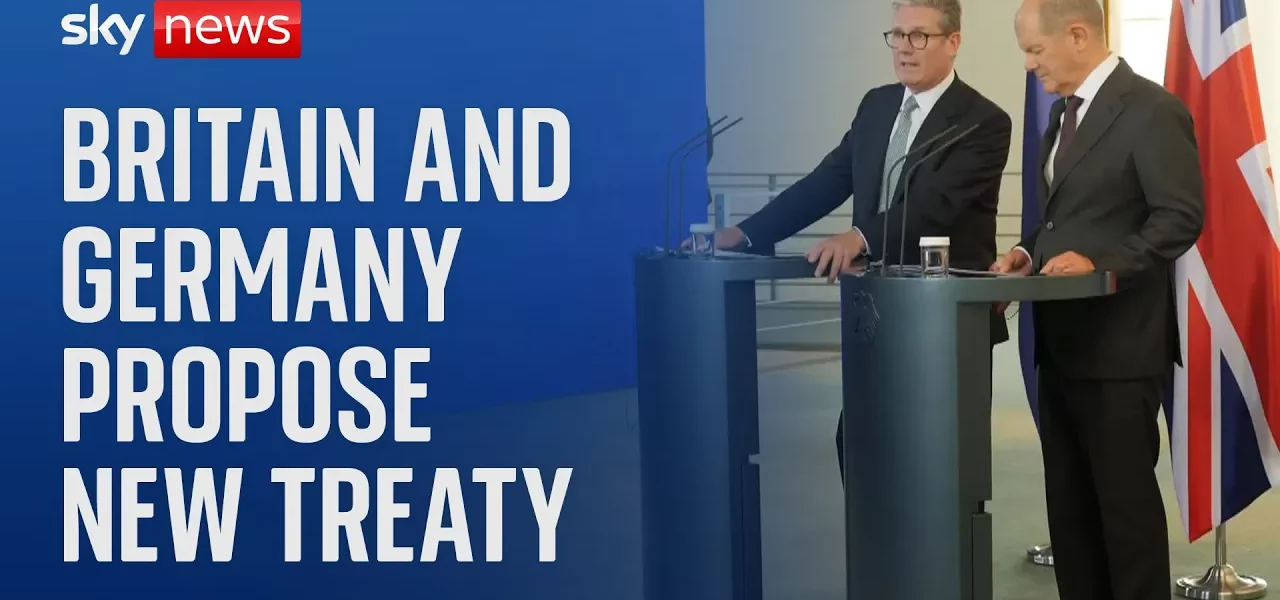Strengthening Ties: Germany and the UK Discuss a New Bilateral Treaty

In a significant diplomatic move, UK Prime Minister Keir Starmer and German Chancellor Olaf Scholz are poised to enhance bilateral relations through the establishment of a comprehensive treaty. This article delves into the discussions that outline the future of UK-Germany cooperation, focusing on trade, security, and shared values, while addressing key regional and global challenges.
Introduction
The recent meeting between Prime Minister Keir Starmer and Chancellor Olaf Scholz marks a pivotal moment in UK-Germany relations. As the two leaders expressed their commitment to fostering a deep and enduring partnership, they acknowledged the historical ties that bind their nations. The proposed treaty aims to address various facets of cooperation including economic ties, defense agreements, and joint initiatives to tackle pressing issues such as the situation in Ukraine and irregular migration.
Historical Context and Current Relations
Germany and the United Kingdom share a long-standing and robust partnership that has evolved over decades. Both nations have collaborated on numerous fronts, including trade, security, and cultural exchange. The recent shift in political leadership in the UK with Keir Starmer’s premiership provides a fresh opportunity to reaffirm and strengthen these ties. The leaders are keen on establishing a new framework, as previous agreements have not fully encapsulated the breadth of their relationship.
Shared Values and Trust
The foundation of the UK-Germany relationship rests on shared democratic values and mutual trust. Both nations have consistently advocated for a collaborative approach to international relations, particularly within the context of Europe. This partnership is not merely transactional; it is built on a deep understanding of each other’s political landscapes and cultural nuances.
The New Bilateral Treaty: Objectives and Expectations
The proposed treaty is envisioned as a comprehensive framework that encompasses a wide range of issues vital to both countries. The leaders have outlined several key areas of focus:
- Trade Relations: Enhancing economic ties through improved trade agreements, fostering growth for both economies.
- Security Cooperation: Strengthening defense collaboration, particularly in light of ongoing geopolitical tensions.
- Support for Ukraine: Maintaining a unified front in supporting Ukraine amidst its ongoing conflict.
- Migration Policies: Developing joint strategies to address illegal immigration while promoting legal pathways for migration.
Trade Relations
The UK is already Germany’s second-largest trading partner, and both leaders recognize the potential for growth in this area. The treaty aims to streamline trade processes and reduce regulatory barriers, thus enhancing economic cooperation. Starmer emphasized that economic growth is a priority for his government, directly linking it to stronger ties with Germany.
Security Cooperation
With rising global security concerns, the leaders discussed the importance of a united approach to defense. This includes bolstering NATO’s European pillar and enhancing collaborative efforts in military support for Ukraine. The treaty is expected to expand upon existing defense agreements and address emerging threats in a volatile world.
Addressing Current Global Challenges
The Situation in Ukraine
Germany and the UK have reaffirmed their unwavering support for Ukraine, pledging both financial and military aid. The leaders discussed the allocation of significant resources, including a €4 billion bilateral aid package and a collective G7 loan of €50 billion to ensure Ukraine’s economic stability. This commitment reflects the countries’ shared dedication to promoting security and democracy in Europe.
Migration and Border Security
The leaders acknowledged the complexities surrounding migration, particularly in light of recent security incidents. They expressed the need for a coordinated response to tackle illegal immigration effectively. This includes enhancing intelligence sharing and operational collaboration to dismantle smuggling networks operating across Europe.
Conclusion
The discussions between Prime Minister Keir Starmer and Chancellor Olaf Scholz signify a renewed commitment to strengthening UK-Germany relations. As both leaders look forward to finalizing the new treaty, they aim to foster deeper cooperation across various sectors, including trade, security, and cultural exchange. This is a pivotal moment for both nations, providing an opportunity to address mutual challenges and reaffirm their roles as key partners in Europe.
As these developments unfold, it will be crucial for both governments to navigate the complexities of their relationship with the European Union while enhancing bilateral cooperation. The commitment to a new treaty not only reflects the ambition for a collaborative future but also serves as a testament to the enduring friendship between Germany and the UK.
Call to Action: Stay informed about the latest developments regarding the UK-Germany treaty and other international relations by subscribing to our newsletter.
“`




